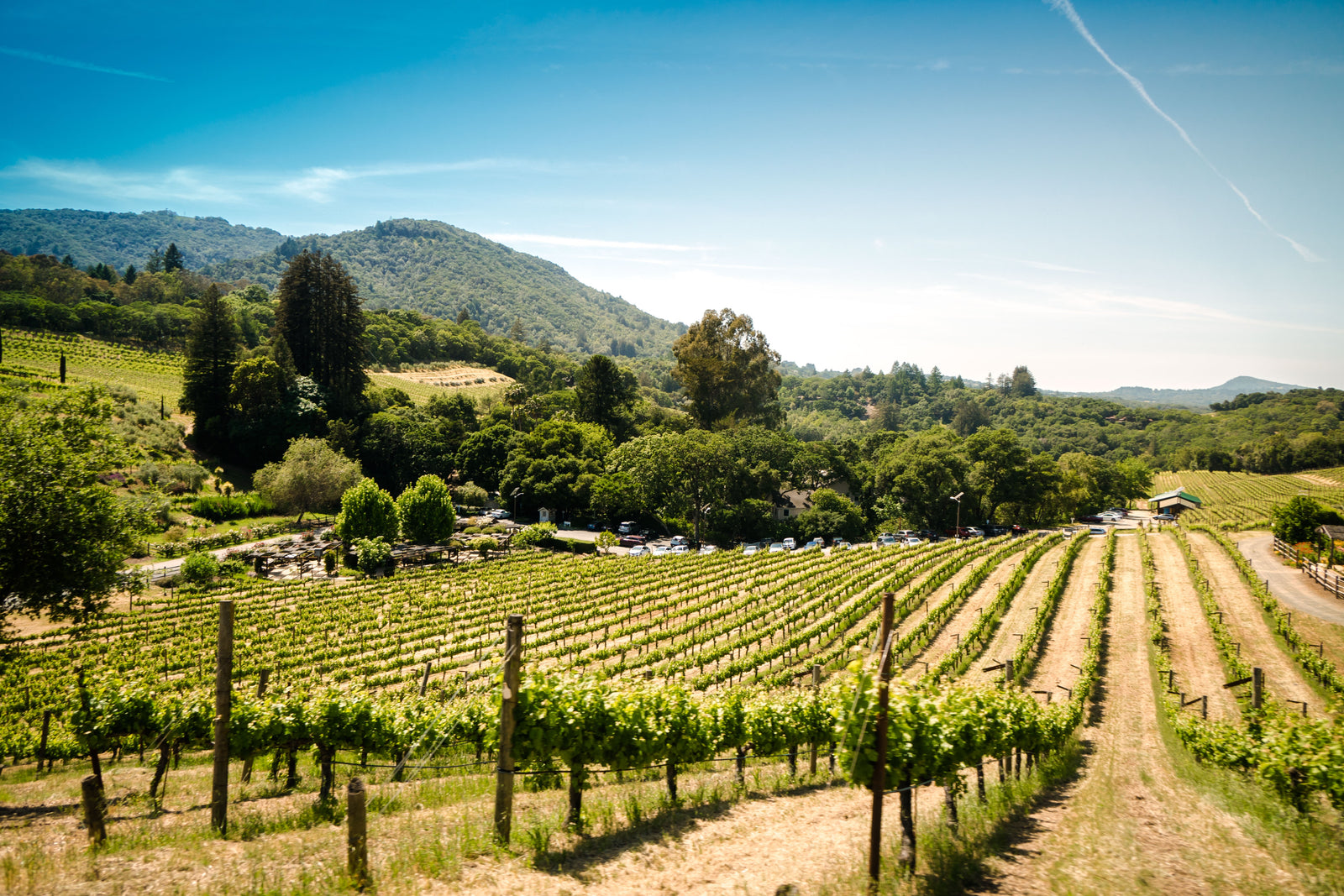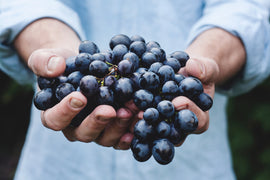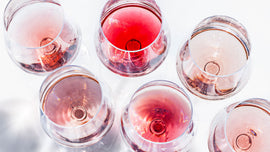It all started when a man met a woman in a wine bar. Some wine was sipped, a kiss was exchanged, and a short five weeks later they were engaged. With a longing for adventure and a shared dream of making wine, they sold their belongings and embarked on a winemaking trip around the world. They traveled throughout thirteen countries, making wine in New Zealand and the south of France, getting married along the way. Returning home penniless, they borrowed a basket press and with a lot of foot stomping, Dylan and Tobe Sheldon created their first 420 cases of Sheldon wine in 2003. Now a Micro-Winery producing about 1,000 cases per year, their goal is to strike a balance between what can be austere European styling, and an overly fruity or barrel-heavy California style. Proudly using "circa 1900 state-of-the-art technology”, they follow a truly minimal intervention winemaking approach. They closely monitor ripening grapes by using their noses and palates, rather than relying on lab equipment. Dylan says, “I moved away from large production lots and traveling frequently for sales in favor of focusing all my energy on these 1 and 2 barrel lots, which allows me to fine-tune the farming on a handful of rows, and see how far we can push the quality and aromatic intensity.” Hand-harvested and sorted, open-top fermented, hand punched-down, gently basket-pressed, their wines are aged in neutral French oak to allow the vineyard flavors rather than new oak to take center stage. The wines are racked according to lunar cycles to maximize gravitational lees compression before bottling unfiltered and unfined. To encourage harmonious fermentation, music is played in the winery for the wines in barrel. Never shy with their philosophy, they say “No new oak was harmed in the making of this wine. Unfined and unfiltered, because sterile wines have no soul.”
Sheldon’s 2017 Vermentino comes from the Carneros growing region on the Sonoma County side, and specifically the Las Brisas Vineyard. The 110-acre Las Brisas Vineyard lies on a gentle, west-facing slope in the heart of Carneros. The vineyard is often covered in fog until noon or later when a cool breeze blows in from the Pacific Ocean and San Pablo Bay. The vineyard was named by the Mahoney family after those winds that drive morning fog into the vineyards and usher in cooling airflow. The Mahoney family is legendary for being one of the truly dedicated growers and champions of Vermentino in California. The unique Carneros soil structure and location provides the perfect growing conditions for the Vermentino grape.
As a consulting winemaker Dylan had the pleasure of working with fruit from the Las Brisas Vineyard for a few years, but this is the first vintage produced under their own label and with their stylistic touches. The fruit was hand-harvested on the 21st of September, with a fairly wide range of brix between the sun side and shade side of the rows, thereby getting multiple levels of ripeness and flavor development. This Vermentino was crushed on whole cluster, covered with a cold CO2 blanket (dry ice) for a few hours of skin contact. It was then pressed to settling tanks overnight, then racked down to stainless barrels and sent to the cold room. After a month of cool stainless-steel fermentation and twice weekly lees stirring, it was left to rest for the winter.
The Sheldons describe their 2017 Vermentino as “…just plain fun! Nose leads off with a beguiling mix of citrus leaf, mint, and green almond. Palate weight is medium, possessing a touch of salinity that pops the bright acidity with a nice mouthwatering zip. Flavor profile is balancing right on the intersection of citrus and stone fruit (my happy place). The finish rolls out with silky viscosity, a rumor of pineapple, and memory of daffodil. With this in my glass, bring me oysters plucked from the cold briny sea, and I will be a happy man.” (I couldn’t have said it better.)
Sheldon Wines 2017 Vermentino is $25.00/bottle, $270.00/case.
It all started as an idea dreamed up in the alley behind the Spago-Beverly Hills Restaurant. Kevin O’Connor was wine director at Spago and Matt Licklider was the national sales director for North Berkeley Wine Imports. The alley served as a makeshift tasting area and the rain gutter as a spit bucket. It didn’t take long for conversations about Burgundy, Piedmont, and Rhône to evolve into ideas about winemaking. They both were critical of the “bigger is better” mantra that had taken hold, and wondered if it were possible to make wines that favored nuance over power. In 2005, relying on nothing more than their palates and connections made in the industry, and using Europe and the more restrained California wines of the 1980’s as their inspiration, they embarked on a winemaking journey of their own and christened their winery “LIOCO”, using a combination of their last names. Today, the winery is owned and operated by the Licklider family. Husband/wife duo Matt and Sara and their small team produce their wines at a state-of-the-art winemaking cooperative in Santa Rosa. All of the fruit is purchased from exceptional vineyards spanning 200-miles and three California counties (Santa Cruz, Sonoma, and Mendocino).
LIOCO’s “Sativa” Carignan comes from Jim McCutchen’s low-yielding old vines grown in a remote, dry-farmed, south-facing vineyard planted 2,400 feet high on Pine Mountain, just outside the town of Cloverdale in Sonoma County. “Like islands in the clouds” — that’s how grape growers describe the view from Pine Mountain-Cloverdale Peak on mornings when much of Sonoma County is swathed in a blanket of clouds. Among Sonoma County’s newest viticultural areas, Pine Mountain-Cloverdale Peak is one of the highest and most remote. Comprising 4,600 acres, with just 230 acres planted, the AVA (or wine region) was approved in 2011. Jim’s vineyard straddles the Sonoma County-Mendocino County border and qualifies for the new Pine Mountain-Cloverdale Peak AVA, but it has historically been classified as Mendocino County, and the wine therefore carries the Mendocino designation. The soil is a mix of hard shale & clay. Jim planted the vines himself about 70 years ago and continues to tend his un-trellised, head-pruned vines.
Carignan is a name borrowed from French, and is also known as Bovale di Spagna, Cariñena, Carinyena, Mazuelo, Samsó and other synonyms. The variety is actually Spanish in origin, although for a long time it was thought to have originated in Italy. Its still-undetermined crossing happened somewhere in the lower part of Aragón in Spain’s northeast, and possibly near the town of Cariñena, resulting in it taking the name. Carignan has many different expressions. The main one is a highly-pigmented, rustic blending grape used in the Rhône. But in California, when made from old vines, it can be aromatic and layered, and that’s exactly what LIOCO produced. 22.8 tons of this old-vine Carignan were hand-harvested on Sept 14, 24, and 25. An intense sorting was done to select only the best clusters. The triaged fruit was ‘submerged cap’ fermented (100% whole cluster) in T-bins and was pumped-over only when necessary during an 18-day fermentation. It spent 9 months in neutral oak and 1 month in tank prior to bottling. These techniques have the effect of bringing brightness and freshness to the wine while also integrating the grape tannins with the fruit. While this wine is structurally similar to some cool-climate Californian or Oregon Pinot Noirs with its high acidity, moderate weight, and medium tannins, the untamed, edgy flavors provide an entirely different experience. For the 2016 bottling, only 1623 cases were produced.
The 2016 Lioco “Sativa” Carignan is a dry, medium-bodied red wine that is refreshing, juicy, mouthwatering, and complex. It has aromas and flavors reminiscent of red fruits such as cranberry, raspberry, and plum, along with black fruits such as black cherry and blackberry, all complimented by spicy pepper. While enjoyable now, it has the structure to develop for several years. Try LIOCO’ s “Sativa” Carignan with roasted and cured meats, roasted squashes, eggplant lasagna, or a savory onion and mushroom tart. The wine can pair particularly well with the spices of southern Spain and even the piquant seasonings of Morocco and Algeria.
The 2016 LIOCO Carignan is $28.00/bottle, $302.40/case.





